WHAT CAUSED WORLD WAR I?
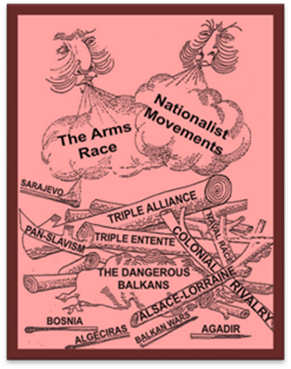
Causes of World War I
by Hank Morgan
Unit
Overview
By
the twentieth century, the competition among the nations of Europe developed
into intense rivalries and deep resentments.
Nationalism, imperialism and militarism combined to convince countries
that conflict was a valid way to settle disputes. Events like the Franco-Prussian War led
Europeans to believe that it was possible to overwhelm the enemy quickly and to
force the defeated to pay. Eventually,
all the major nations of Europe were drawn into World War I, and each one was
convinced that it would emerge as the victor.
In short, every country was in it to win it. Let’s see how it all happened!
STOP:
Answer Section A Questions
The European Mood
When
the twentieth century began, Europeans had developed a sense of pride,
superiority and self-confidence in their individual nations. These intense beliefs in country became known
as nationalism. By 1914, most
industrialized nations had given all male citizens the right to vote. While this did not guarantee democratic
government, it did give people a vested interest in their country. A new kind of political leader also began to
emerge. Supported by political parties,
politicians had to sell their agenda to the voters and to convince the public
that their course of action was the correct one. These leaders often used their followers’
love of country to encourage national unity and to support for their foreign
policies.

Nationalism
extended overseas as countries competed for colonies, new markets and raw
materials through imperialism. This led to serious rivalries for political
and economic supremacy. As colonial
interests continued to clash, leaders came to believe that war was the best way
to settle international problems.
Governments used military might to back up their demands in a
crisis. The race to build larger armies
and to stockpile weapons became known as militarism. It also glorified war as the highest form of
patriotism. Military officers perfected
their plans for victory and hoped for a chance to put their ideas to the
test. They urged political leaders not
to delay taking action since time would only permit other countries to become
stronger. Both France and Germany
doubled the size of their armies between 1870 and 1914 for the war which each
accepted as inevitable. Most Europeans
believed that modern weaponry would result in a short conflict which their
nation would win in a few months.
STOP: Answer Section B Questions
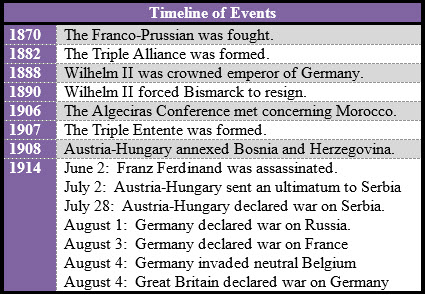
The
Franco-Prussian War
By
1867, Prussia was well on its way to
forming a single German nation. Kaiser Wilhelm I, also known as Emperor
William I, had made Otto von Bismarck
his prime minister, or chancellor. His priority was the unification of Germany
and only few southern German states were still refusing to participate in this
plan. For the inhabitants of these
regions, religion was the key issue.
Most people in this area were Catholic and did not want to be dominated
by the Protestant states to the north.
Bismarck believed he could win their support if their security was
threatened, and he began to look for an opportunity to provoke a war with
France.
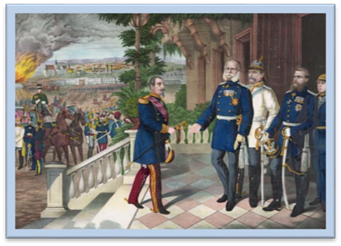
Napoleon III Surrenders to Wilhelm I
Bismarck’s
chance came in 1868 as a result of events in Spain. Revolutionaries
overthrew their queen and offered the throne to Leopold, a relative of the
German emperor. The French protested
since they did not want their nation surrounded with countries ruled by the
royal house of Germany. Bismarck
manipulated releases to the press and encouraged the resentment of both the
French and the Germans. He knew this
would result in a military conflict, but he also knew that Prussia was
thoroughly prepared. Soon citizens in
both countries demanded a military solution.
As expected, France declared war on Prussia on July 19, 1870.
While
the French army was getting organized, Prussians forces poured into northern
France. The stunned French troops were
quickly defeated in five months, and the Prussians dictated harsh terms in the
peace settlement. France was forced to
pay a huge sum of money to Prussia and to surrender the provinces of Alsace and Loraine to Germany. Because
those areas were rich in coal and iron, this dealt an additional economic blow
to France.
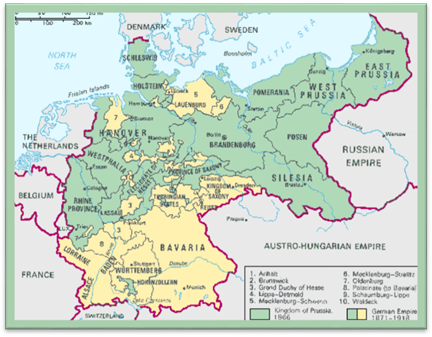
Map of the German
Empire 1871
As
far as Bismarck was concerned, the war had the desired effect. The southern states were convinced to join
Prussia, and the Second Reich, the
term the Germans used for their empire, became a reality. The new German nation had a solid economic
base, and German industry grew rapidly.
The French, on the other hand, were humiliated and embittered. They were also determined to regain the
Alsace and the Lorraine.
STOP: Answer Section C Questions
Entangling
Alliances
Once
Germany became a unified country, Bismarck, nicknamed the Iron Chancellor, wanted to eliminate the influence of France which
he believed to be Germany’s greatest threat.
He planned to isolate the French by building alliances with other
nations. Therefore, Bismarck created the
Triple Alliance among Germany,
Austria-Hungary and Italy. According to
this agreement, Germany and Austria-Hungary would protect Italy from France;
Italy would remain neutral if war broke out between Austria-Hungary and
Russia. However, Bismarck knew there was
a possibility that the Russians and the French might unite against the
Germans. This would force Germany to
fight a war on two fronts. Therefore,
the Germans negotiated a separate treaty with the Russians which stated that,
if either country went to war, the other would remain neutral.
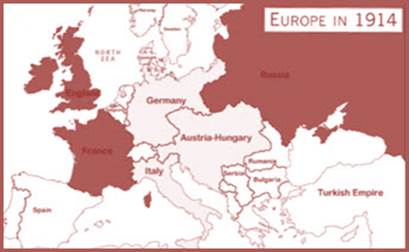
Map of
European Alliances by John Claire
The
British, already alarmed by Germany’s military build-up, began their own search
for allies. Although they had often been
at odds over the quest for colonies, Great Britain and France signed an
informal agreement known as an entente.
Once Bismarck was out of office, Germany chose not to renew its treaty
with Russia. In 1907, the Russians
joined the British and the French in an official agreement known as the Triple Entente. Although it was not as formal as the Triple
Alliance, France and Russia were reasonably sure that Great Britain would not
fight against them. These agreements
divided Europe into two hostile camps and greatly increased international
tensions. Even a minor dispute between
any two powers of opposite alliances had the potential to draw all of Europe
into war.
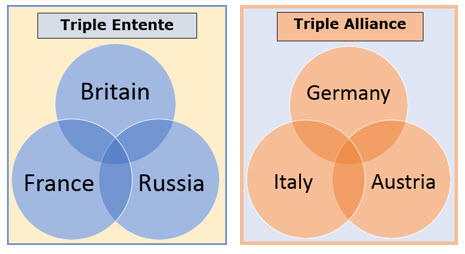
STOP: Answer Section D Questions
Change
in Leadership; Change in Personality
Bismarck’s
cleverly crafted system of alliances and treaties managed to offset the French
desire for revenge over the results of the Franco-Prussian War, but a change in
leadership transformed the way Germany dealt with foreign affairs. Kaiser
Wilhelm I had left diplomatic relations with other nations in Bismarck’s
capable hands, but his death gave Germany a new leader. The late Kaiser’s son, Frederick, inherited
the throne but died ninety days later from throat cancer. Therefore, a grandson of Wilhelm I was
crowned Kaiser Wilhelm II in 1888
and became Germany’s new ruler.

Kaiser Wilhelm II
Wilhelm
II was a young, unstable and stubborn person who surrounded himself with those
who told him what he wanted to hear. His
advisors agreed with the new leader’s assessment that his capabilities made
Bismarck unnecessary. Therefore, he
dismissed Bismarck in 1890 and set his own foreign and domestic policies. Wilhelm II was eager to show off the
accomplishments of the new German state, but his tactless public statements and
blatant pursuit of world power quickly heightened the tension among the nations
of Europe. For example, even though they
were economic rivals, Great Britain and Germany had remained on reasonably
friendly terms. However, the new Kaiser,
even though his mother was English, had an intense dislike for the
British. He was determined to challenge
them as both a colonial and a naval power.
The Kaiser’s decision to increase the size of the German fleet and his
abrasive comments describing this action encouraged Great Britain to begin an
ambitious program of shipbuilding as well.
This new brand of German diplomacy added to the feelings of distrust and
suspicion among European nations.
STOP: Answer Section E Questions
Crises
in Africa
As
European countries expanded their colonial empires, friction escalated in other
areas of the globe, and the tension soon became apparent in northern
Africa. Great Britain had given Morocco, an area rich in natural
resources and trade possibilities, to France in 1904. Some Moroccans, however, pushed for
independence. Kaiser Wilhelm II decided
to take advantage of the situation and made a personal visit to the French
territory. He publicly declared Morocco
an independent state and demanded the same trading rights as the French. The resulting uproar brought Europe close to
war. The Germans demanded an international
conference to settle the issue. The Algeciras Conference concluded that Morocco
should be made a French protectorate, and Germany went home empty handed. The incident widened the divide between the
Triple Entente and the Triple Alliance.
It reinforced the British/French view that Germany was a serious threat
and convinced the Germans that the rest of the world was trying to hold them
back.
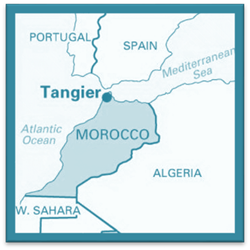
Map of
Morocco
Military
conflict nearly erupted in Morocco again in 1911. The Germans claimed the French had violated
the agreement reached at the Algeciras Conference in 1906 and sent a warship to
make the point. Great Britain again
supported France and issued strong warnings to Germany concerning the use of
violence. War was avoided when Germany
agreed to give the French free rein in Morocco in exchange for a section of
French territory in Africa’s Congo region.
STOP: Answer Section F Questions
Crises
in the Balkans
Another
hot spot was the area known as the Balkans. Three multi-ethnic empires of Turkey, Russia
and Austria-Hungary dominated this region.
They all lagged behind their Western European counterparts in terms of
both industrial and military strength. A
wave of nationalism swept through the region, and people within these empires
wanted their own nations. Ethnic groups
faced persecution when they demanded civil rights and, eventually,
independence. For example, the Ottoman Emperor Abdul Hamid II massacred over
100,000 Armenians within his borders
in 1895 in answer to their request for some role in the government. Russian
Jews lived in fear of mob attacks known as pogroms, which destroyed their
homes and businesses.
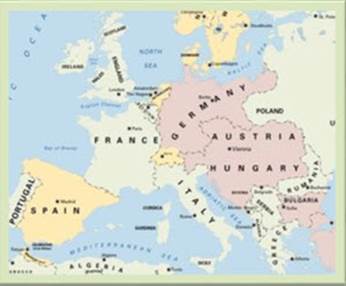
Map of
Europe: 1914
The
weakest of these empires was the Ottoman
or Turkish Empire. By 1900, several
groups had broken away and formed new nations including Albania, Bulgaria,
Montenegro, Romania, and Serbia.
Nationalism encouraged Serbia,
which had a large Slavic population, to absorb all the Slavs in the Balkan
region under its flag. Russia, who also
had a large Slavic population, saw itself as the protector of the Slavs and
supported these movements. The Russians
also thought that friendly relations with these countries would give them
access to seaports on the Mediterranean.
All of this put Russia in direct confrontation with Austria-Hungary
which felt threatened by this rise of nationalism in the Balkans.

Painting Showing a Scene from the First Balkan War
Both
Austria-Hungary and Serbia had plans to take over Bosnia and Herzegovina, two Balkan states with large Slavic
populations. The Austrians moved first
and annexed both countries in 1908.
Serbia was furious, and Russia supported the Serbians by announcing
plans to mobilize for war. However,
Germany stood firmly behind its ally, Austria Hungary. Since the Russians knew they were unprepared
to go to battle against both the Germans and the Austrians, Russia backed down,
and war was averted. However, incidents
in the Balkan region continued to lead to more crises such as the First and Second Balkan Wars. Peace became more fragile with each incident.
STOP: Answer Section G Questions
The
Final Straw
By
the summer of 1914, most Europeans had come to the conclusion that war was
inevitable. The annexation of Bosnia by
Austria-Hungary continued to be deeply resented not only by Bosnia itself but
also by Serbia. Terrorist groups formed
throughout the region, and one of them, called the Black Hand, was determined to do something dramatic to draw
worldwide attention to their cause. An
opportunity came on June 28, 1914. The
51-year old, unpopular heir to the Austrian throne, Franz Ferdinand,
accompanied by his wife, was scheduled to inspect Austro-Hungarian troops
stationed near the capital city of Sarajevo
in Bosnia. Local dignitaries were to
meet the royal couple at the train station and to take them by car to City Hall
for lunch before the military review.
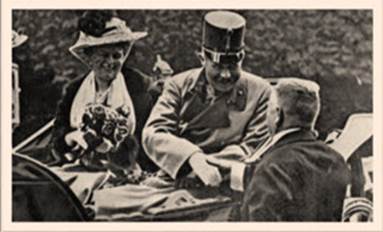
Archduke
Franz Ferdinand
Bosnian
officials knew of the Black Hand and were on high alert. As crowds lined the streets, seven members of
the group were stationed along the motorcade route and managed to throw a bomb
under the car traveling behind the Archduke.
Although he and his wife were not hurt, several members of the
Archduke’s staff were injured and hospitalized.
Franz Ferdinand insisted on stopping by the hospital after lunch to
check on the injured. Since there was
some confusion over the exact course, Gavrilo
Princip was able to approach the
car, fire two shots and kill both the heir to the Austrian throne and his wife.
Pulling
in the Major Powers
As
the news of the assassination spread, people were horrified but not
surprised. Austria-Hungary blamed Serbia
for the crime but did not react immediately.
Instead, they conferred with the Germans to assure their backing if a
war with Serbia involved other powers.
Kaiser Wilhelm II provided the Austrians with a blank check, which meant that Germany would support any course of
action Austria chose. On July 23, 1914,
Austria-Hungary sent a set of demands, or an ultimatum, to the Serbians and gave them forty-eight hours to
reply. The list was deliberately harsh;
the Austrians did not expect the Serbs to comply. However, the Serbs knew that not to do so
would mean war with Austria-Hungary, a powerful enemy. Therefore, Serbia accepted the terms of the
ultimatum but requested arbitration on two items. The Austrians, unsatisfied with this
response, declared war on Serbia on July 28, 1914.

Austrian Postcard: 1914
On
the following day, Russia began moving troops to the border it shared with
Austria in support of Serbia. The
Germans saw this as a threat to their ally and declared war on Russia. Knowing that France would honor the Triple
Entente, Germany also declared war on France and quickly invaded Belgium, a neutral country, in order to
attack the French from the north. This
prompted Great Britain to declare war on Germany. The alliance system quickly pulled the major
powers of Europe into a full-scale war.
Everyone was in it to win it.
Remembering the example set by the Franco-Prussian War, the idea was to
fight a short war, to win quickly and to make the enemy pay. No one really understood that the conflict,
which became known as World War I,
would be global, long and enormously destructive.
STOP: Go to Section H Questions
What
Does It All Mean?
As
Europe rushed to battle, both sides were confident they could achieve a quick,
easy victory. People reasoned that a
brief conflict would resolve tensions between countries, slow political turmoil
and postpone social change. War was
viewed as a glorious and heroic quest as well as a test of national unity. The Great War, as World War I became known,
would shatter every expectation. No one
fully realized the destructive power of modern warfare or the potential of the
United States of America. How would the
world deal with a long, devastating conflict?
How would people cope with the loss of life as well as the physical
damage? Would all the countries involved
continue to fight and would they continue to honor their original
alliances? History holds the answers to
these questions.
Additional Activities and Resources

In
1914 Germany and Russia Talked about Avoiding the War but Failed to Stop It
Article with Quiz
The M.A.I.N.
Causes of World War I Worksheet